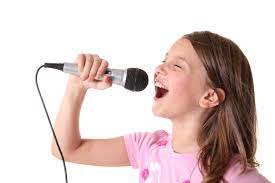"There is a new rule being enforced at OSA. Starting on Monday, May 6th, there will be restricted speaking for students in the Vocal sub-pathway. As you can assume, the Vocal students are furious" -- Cb Omand, 8th grade
The following article is a special May investigation by the OSA Shallot staff, aiming to bring you the very best of the campus' fake news

There is a new rule being enforced at OSA. Starting on Monday, May 6th, there will be restricted speaking for students in the Vocal sub-pathway. As you can assume, the Vocal students are furious at the restriction of their 1st Amendment right to freedom of speech. However, there is more to it than it seems.
After talking to Principal Ornelas, it was found that Ms. Plette, the Vocal department chair, requested this rule to make sure that the Vocal students' voices are rested and ready for their arts classes. The only time that they are allowed to speak is during the Vocal Music class, as well as when they get called on in academic classes. Allegedly Ms. Plette was upset that they will still be able to talk in academic classes, even if it's only for answering questions. However, Mr. Ornelas would not stand by the rule if it was going to interfere with their education—despite the protest of some academic teachers.
One 8th grade Vocal student Abigail Ambrose is particularly upset with this new rule. “It's kind of unacceptable, I really enjoy talking, I'm kinda a yapper,” she said. “So I think it's really unfair that we are getting banned from talking, what about the 1st Amendment?” Ambrose spoke a bit about how Vocal as a whole is feeling right now. “They are planning on tp-ing [toilet papering] a lot of classrooms and breaking into lockers. There will be a lot of damage done because we are alphas, you know? You can't take our voice.” Clearly, the Vocal students are very upset and the school should be ready for some damage.
After talking to Principal Ornelas, it was found that Ms. Plette, the Vocal department chair, requested this rule to make sure that the Vocal students' voices are rested and ready for their arts classes. The only time that they are allowed to speak is during the Vocal Music class, as well as when they get called on in academic classes. Allegedly Ms. Plette was upset that they will still be able to talk in academic classes, even if it's only for answering questions. However, Mr. Ornelas would not stand by the rule if it was going to interfere with their education—despite the protest of some academic teachers.
One 8th grade Vocal student Abigail Ambrose is particularly upset with this new rule. “It's kind of unacceptable, I really enjoy talking, I'm kinda a yapper,” she said. “So I think it's really unfair that we are getting banned from talking, what about the 1st Amendment?” Ambrose spoke a bit about how Vocal as a whole is feeling right now. “They are planning on tp-ing [toilet papering] a lot of classrooms and breaking into lockers. There will be a lot of damage done because we are alphas, you know? You can't take our voice.” Clearly, the Vocal students are very upset and the school should be ready for some damage.

Parents are also weighing in on the ban. Amy Omand, a parent of an 8th grader and a carpool driver to two Vocal students said, “While I love the Vocal kids that I drive, I wonder why Mr. Ornelas didn't carry the ban till outside of school. The Vocal kids that I drive are very well, vocal at like 8 am."
However, some non-vocal students have other more positive opinions. Eighth grade Literary Arts student Zanthe Jones-Gerachis says she is ecstatic about the ban. “Oh my goshidy gosh I'm so flippity fracking that happy silence will be restored to the world finally,” she exclaimed.
There are many students who are very happy about the ban because of loud behavior that a lot of Vocal students often express. When asked about why she thought the ban was created, Jones-Gerachis said, “That's a stupid question. Why? Whyyyyy? The constant talking is why. I mean hello I'll be doing an interview in the hallway and then there's just singing, from where!?”
There has been a lot of talk about how this is unconstitutional and goes against not just the 1st Amendment but basic morality. as well. While it is against the 1st Amendment, technically the rule was not created to be unconstitutional—it was created strictly to protect the vocal students' Voices. Many non-vocal students, like Jones-Gerachis, are happy that the vocal students can’t speak in class because they tend to be disruptive, similar to how Ambrose previously stated she was a “yapper.”
There are many pros and cons to this new rule, but it's looking like Vocal students will just have to endure the last four weeks of school with no free speech. If there are enough complaints to the school, administrators might reconsider the rules for the next school year.
However, some non-vocal students have other more positive opinions. Eighth grade Literary Arts student Zanthe Jones-Gerachis says she is ecstatic about the ban. “Oh my goshidy gosh I'm so flippity fracking that happy silence will be restored to the world finally,” she exclaimed.
There are many students who are very happy about the ban because of loud behavior that a lot of Vocal students often express. When asked about why she thought the ban was created, Jones-Gerachis said, “That's a stupid question. Why? Whyyyyy? The constant talking is why. I mean hello I'll be doing an interview in the hallway and then there's just singing, from where!?”
There has been a lot of talk about how this is unconstitutional and goes against not just the 1st Amendment but basic morality. as well. While it is against the 1st Amendment, technically the rule was not created to be unconstitutional—it was created strictly to protect the vocal students' Voices. Many non-vocal students, like Jones-Gerachis, are happy that the vocal students can’t speak in class because they tend to be disruptive, similar to how Ambrose previously stated she was a “yapper.”
There are many pros and cons to this new rule, but it's looking like Vocal students will just have to endure the last four weeks of school with no free speech. If there are enough complaints to the school, administrators might reconsider the rules for the next school year.


